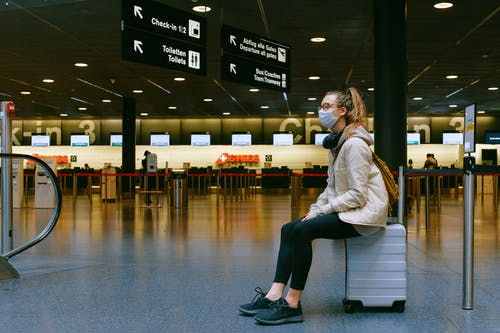
As the world cautiously emerges from lockdown and summer begins, many people are wondering: is it safe to travel during COVID-19? Can I still take a vacation this year? What if I have to travel for personal or professional reasons?
With COVID-19 still spreading and the death toll still climbing, the safest place to be is still at home. The CDC is still recommending against international travel, especially with many flights getting canceled and the specter of a second wave still looming. But if you just can't stand to look at your own four walls anymore -- or if you have some kind of personal or professional emergency that requires travel -- you can take a trip if you do so safely. Make sure you wear a mask and follow proper social distancing and safety guidelines to protect yourself and others.
Maintain Six Feet of Social Distance
Traveling can be a relatively low-risk activity, if you do it in your own car and maintain six feet of social distance between yourself and others. Keep your distance from others unless absolutely necessary. Pay for gas at the pump, and pick up food from drive-throughs, curbside service, or self-serve counters in gas stations and grocery stores. Wash your hands after using public facilities and getting gas or going into a gas station or store.
If you don't own your own car, you can safely rent a car. Experts agree that rental cars should be safe, as long as the rental car company disinfects its cars between customers. For additional protection, carry sanitizing wipes and wipe off high-touch areas in the car, like the steering wheel, door handle, gear shift, rearview mirror, and radio dials.
Wear a Mask
Wear a face mask when in public, especially in situations where you can't socially distance from others around you, like in airports or on planes. Buy plenty of cotton face masks to last for your whole trip, so that you can change your mask after each wear or whenever it gets damp. Consider wearing a mask with a filter pocket and using paper towels, tissues, or coffee filters for additional filtration.
Wash Your Hands and Avoid Touching Your Face
Wash your hands frequently with soap and water for at least 20 seconds, using proper handwashing techniques. Avoid touching your face, mouth, or eyes unless you have just washed your hands. Wash your hands before and after eating, after going to the restroom, and before and after adjusting your mask.
Carry Hygiene Products, and Use Them
Carry hand sanitizer made with at least 60 percent alcohol and use it when you can't wash your hands. Use the same technique you use for hand-washing to thoroughly coat your hands in sanitizer, and keep rubbing them together until they feel dry.
If you have access to sanitizing wipes, carry them with you and use them to sanitize high-touch areas in your rental car and hotel room or Airbnb. Wipe off the phone, door handles, sink and bathtub faucets, TV remotes, toilet handles, and flat surfaces. If you fly, wipe off the armrests of your seat, your tray table, your TV remote buttons, and the sidewall, if you have a window seat.
Avoid Cruises, Campgrounds, and Air Travel
Diseases like COVID-19 spread quickly in the close confines of a cruise ship, so avoid cruises until the CDC says otherwise. You should also avoid going to public campgrounds -- while outdoor activities are safer than indoor ones, you run a higher-than-average risk of coming into contact with an infected person at a crowded public campground where campers share bathing and toilet facilities. And, while experts say air travel is safe enough in an emergency, traveling by air involves spending time in airports with people coming and going from all around the world, and spending hours trapped in close quarters with some of those people during your flight.
The air filtration systems airplanes use, and the seating layouts, do a lot to minimize the risk of COVID-19 transmission. But if you must travel by air, wear a mask the entire time you're in the airport and on the plane. Wash your hands frequently, use your sanitizing wipes when necessary, and keep your distance from others, especially those who appear sick. Make yourself aware of your airline's travel guidelines before you leave -- some airlines may be taking passengers' temperatures before boarding, or have made other changes to their normal operating procedures, such as eliminating pet tickets.
COVID-19 promises to change our daily lives for at least a little while, including how we travel. If you travel during the pandemic, take steps to protect yourself and others. The more careful everyone is, the sooner we can all get back to normal.
This article is copyrighted by Travelers Today, the travel news leader



